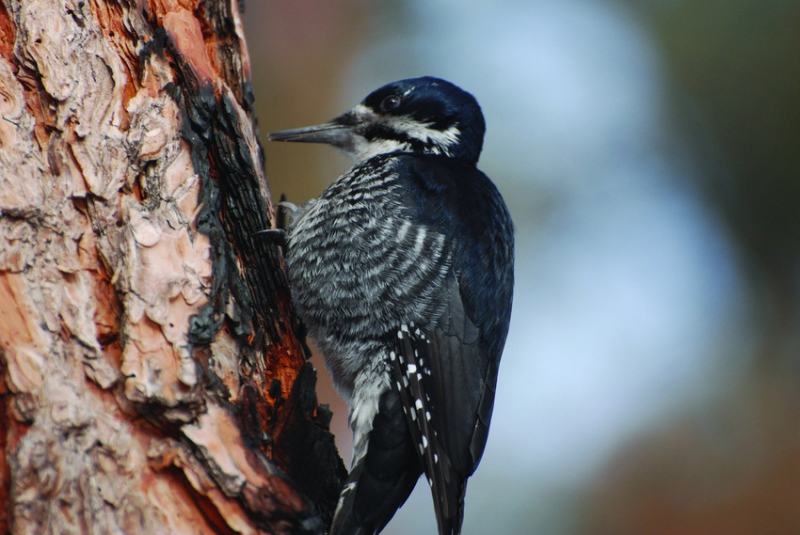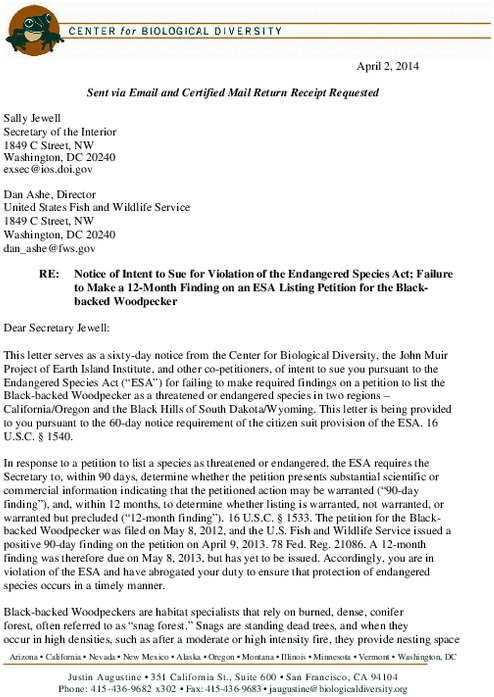From the Open-Publishing Calendar
From the Open-Publishing Newswire
Indybay Feature
Lawsuit Launched to Protect Rare Black-backed Woodpeckers in California, Oregon, S. Dakota
SAN FRANCISCO— The Center for Biological Diversity and the John Muir Project of Earth Island Institute on April 2 filed a formal notice of intent to sue the U.S. Fish and Wildlife Service over the agency’s failure to protect black-backed woodpeckers under the Endangered Species Act.
The Center petitioned the Fish and Wildlife Service in May 2012 to protect the species, and the agency then issued a positive finding, acknowledging the need to conduct a full review to assess the status of the woodpecker in two regions, California/Oregon and the Black Hills of South Dakota. But Fish and Wildlife has yet to complete the required review.
“Endangered Species Act protection is urgently needed for this rare and beautiful species,” said Center Senior Attorney Justin Augustine. “We appreciate that the Fish and Wildlife Service has recognized the serious threats these woodpeckers face — especially from intensive logging — but until listing moves forward, the Endangered Species Act’s lifesaving benefits won’t be available to these birds.”
Black-backed woodpeckers are habitat specialists that rely on burned conifer forest, often referred to as “snag forest.” Snags are standing dead trees, and when they occur in high densities, such as after moderate and high-intensity fire, they provide nesting space as well as large amounts of wood-boring beetle larvae for the woodpeckers to eat.
Unfortunately this habitat type is regularly destroyed by post-fire logging, which removes the dead trees the woodpeckers need for survival. The great majority of this limited habitat is unprotected and therefore open to logging.
“The ESA is the safety net for species like the black-backed woodpecker whose habitat is still largely unprotected,” said Dr. Chad Hanson with the John Muir Project. “For decades now, the science has consistently demonstrated the importance of burned forest habitat for black-backed woodpeckers, but legal protections still do not exist to ensure such areas are conserved rather than logged.”
Just this year the Forest Service has proposed three massive logging projects in California that would destroy critical woodpecker habitat. A recent report produced by the Center for Biological Diversity and the John Muir Project explains how fires are essential for maintaining biological diversity in California’s Sierra Nevada ecosystem and how logging in burned areas causes significant harm to wildlife and the forest.
Photo: USFWS
The Center for Biological Diversity is a national, nonprofit conservation organization with more than 675,000 members and online activists dedicated to the protection of endangered species and wild places.
http://www.biologicaldiversity.org/news/press_releases/2014/black-backed-woodpecker-04-02-2014.html
http://www.biologicaldiversity.org/
“Endangered Species Act protection is urgently needed for this rare and beautiful species,” said Center Senior Attorney Justin Augustine. “We appreciate that the Fish and Wildlife Service has recognized the serious threats these woodpeckers face — especially from intensive logging — but until listing moves forward, the Endangered Species Act’s lifesaving benefits won’t be available to these birds.”
Black-backed woodpeckers are habitat specialists that rely on burned conifer forest, often referred to as “snag forest.” Snags are standing dead trees, and when they occur in high densities, such as after moderate and high-intensity fire, they provide nesting space as well as large amounts of wood-boring beetle larvae for the woodpeckers to eat.
Unfortunately this habitat type is regularly destroyed by post-fire logging, which removes the dead trees the woodpeckers need for survival. The great majority of this limited habitat is unprotected and therefore open to logging.
“The ESA is the safety net for species like the black-backed woodpecker whose habitat is still largely unprotected,” said Dr. Chad Hanson with the John Muir Project. “For decades now, the science has consistently demonstrated the importance of burned forest habitat for black-backed woodpeckers, but legal protections still do not exist to ensure such areas are conserved rather than logged.”
Just this year the Forest Service has proposed three massive logging projects in California that would destroy critical woodpecker habitat. A recent report produced by the Center for Biological Diversity and the John Muir Project explains how fires are essential for maintaining biological diversity in California’s Sierra Nevada ecosystem and how logging in burned areas causes significant harm to wildlife and the forest.
Photo: USFWS
The Center for Biological Diversity is a national, nonprofit conservation organization with more than 675,000 members and online activists dedicated to the protection of endangered species and wild places.
http://www.biologicaldiversity.org/news/press_releases/2014/black-backed-woodpecker-04-02-2014.html
http://www.biologicaldiversity.org/
Add Your Comments
We are 100% volunteer and depend on your participation to sustain our efforts!
Get Involved
If you'd like to help with maintaining or developing the website, contact us.
Publish
Publish your stories and upcoming events on Indybay.
Topics
More
Search Indybay's Archives
Advanced Search
►
▼
IMC Network




